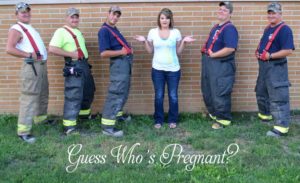By: Robert Avsec, Executive Fire Officer
All fire chiefs and their officers SHOULD BE REQUIRED to read up on this case.
Chicago Fire’s Nursing Mother Case Moves Forward
Women have a right to become firefighters and paramedics. They have a right to become pregnant and start a family. And they have legal rights to protect them and their jobs and their seniority and their job assignments before and after the birth of their child.
Stories like this give this 26-year battalion chief (Retired) a real case of the a$$! I’m proud of the fact that my former department, Chesterfield (Va.) Fire and EMS Department, was much more enlightened and did the right things when our women firefighters began starting families.
Response from LinkedIn Colleagues
I shared the above article, along with my comments above, with my 5,000+ connections on LinkedIn. What follows is the conversation thread from some of those colleagues.
Jim Jollie, Program Manager/professor Fire Programs Seminole (Fla.) State College. “Good article. Clear violations of the law. Now I would like to hear everyone’s opinion of something I posed my fire cadets this week. Since it is clear [that] line firefighters are exposed to carcinogens due to diesel and smoke, and [a] firefighter’s risk of cancer is so much greater than the public, should departments demand pregnant women to go on light duty to protect the life of the baby? It always amazed me women who demanded to stay on shift early in their pregnancy. Just didn’t make sense if we all are trying to protect the health of the baby. Just a curious discussion point.”
My reply to Jim’s comments was, “Nice thought, Jim, but the ruling in Auto Workers v. Johnson Controls stated that the decision is solely between the woman and her physician. An employer can inform and educate, but they can’t dictate in this matter.”
Read more about Auto Workers v. Johnson Controls
Jim Jollie again. “Robert thanks. I will read that case for sure, but I just wonder, if there are presumption laws in  most states, could not the mother go back and claim the job injured her baby, or even May have caused a spontaneous abortion? We have a job that negatively impacts the health and safety of both the mother and child. Just good points for conversation for sure. Thanks again…”
most states, could not the mother go back and claim the job injured her baby, or even May have caused a spontaneous abortion? We have a job that negatively impacts the health and safety of both the mother and child. Just good points for conversation for sure. Thanks again…”
Alisa Arnoff–Partner, Scalambrino & Arnoff, LLP (Chicago area), concentrating in management side labor and employment law. “This is why it’s so important that treating physicians are aware of the occupational hazards to the mother and fetus at each stage of the pregnancy. The appendix to NFPA 1582 [Standard on Comprehensive Occupational Medical Program for Fire Departments] on this is very important and is something that we should make sure pregnant firefighters are sharing with their physicians.”
Jim Jollie again. “Alisa Arnoff … great point for sure. I guess I have heard [of] FF refusing to go on administrative duty early in their pregnancy because they enjoy shift work. These are just interesting discussion points when trying to get people to look at things from different perspectives.”
Curt Varone, Deputy Chief (Ret.) Providence (RI) Fire Department, attorney, and author. A FD cannot force a pregnant employee out of a line position over concerns about her health or the health of the fetus – and a FD cannot force a nursing mother out of a line position. The law is clear and not debatable on both counts. No matter how reasonable some well-intentioned folks think they are being when they claim to be “protecting” the mom or child, the choice to come off-the-line belongs to the mom.
Point of Emphasis
As Alisa Arnoff pointed out, the guiding document here should be NFPA 1582. A good document that is must -reading from the Connecticut Department of Emergency Services and Public Protection Commission on Fire Prevention and Control. In its publication, The Connecticut Fire Academy Recruit Firefighter Program: NFPA 1582 Medical Examination Guidance for Physician (August 20, 215), it provides a step-by-step process for physicians to use in evaluating an individual’s physical fitness for duty as a firefighter.
-reading from the Connecticut Department of Emergency Services and Public Protection Commission on Fire Prevention and Control. In its publication, The Connecticut Fire Academy Recruit Firefighter Program: NFPA 1582 Medical Examination Guidance for Physician (August 20, 215), it provides a step-by-step process for physicians to use in evaluating an individual’s physical fitness for duty as a firefighter.
The guide, using NFPA 1582, defines Category A and Category B Medical Conditions as:
- A Category “A” Medical Condition is a medical condition that would preclude an individual from performing the essential job tasks of a municipal firefighter in a training or emergency operational environment, or present a significant risk to the safety and health of that individual or others.
- A Category B Medical Condition is a medical condition that, based on its severity or degree, may or may not preclude an individual from performing the essential job functions of a municipal firefighter in a training or emergency operational environment, or present a significant risk to the safety and health of that individual or others.
Relative to this discussion, the following language appears on page 9 of that document:
Reproductive [System]
Category A medical conditions shall include:
None.
Category B medical conditions shall include:
Pregnancy, for its duration. Any appointee who is pregnant shall be evaluated based on the appointee’s ability to perform as a fire fighter in a training or emergency operational environment. Furthermore, a pregnant appointee shall be informed of the potential risks to her fetus due to possible exposures during fire fighter duties. [Emphasis added.]
Any other reproductive condition that results in an individual not being able to perform as a firefighter.
Summary
The reality of women firefighters is that they become pregnant; treating them right is best for everyone on the job. Get informed. Get educated. Develop legal policies. Train your officer. This article from Linda Willing How to deal with the pregnant firefighter, is a “must read” for fire service leaders.
Or risk getting your fire department sued with a very good chance of “losing the farm.”
Read More
A Fire Department’s Guide to Implementing NFPA 1582 (IAFC publication)
Bonehead-Decision-of-the-Year: Close the Nominations Please!
 Fire & EMS Leader Pro The job of old firefighters is to teach young firefighters how to become old firefighters!
Fire & EMS Leader Pro The job of old firefighters is to teach young firefighters how to become old firefighters!